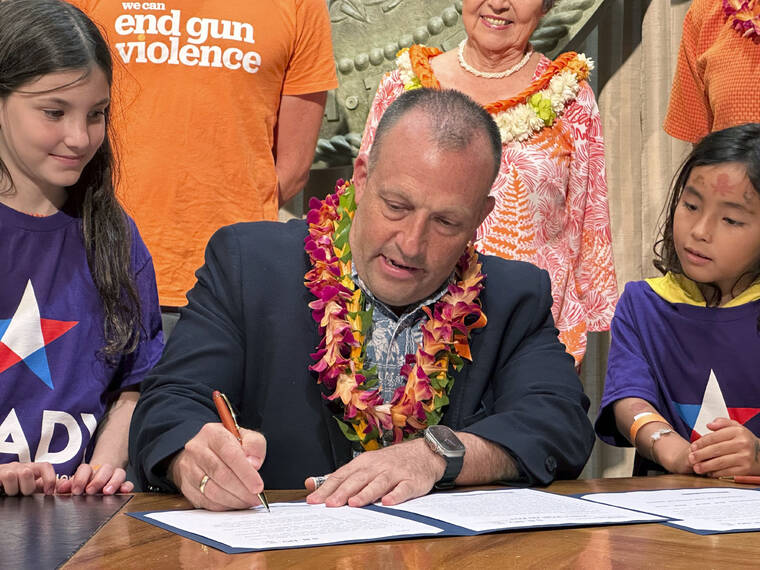Hawai‘i allows more concealed carry after ruling
HONOLULU — Hawaii Gov. Josh Green on Friday signed legislation that will allow more people to carry concealed firearms but at the same time prohibit people from taking guns to a wide range of places, including beaches, hospitals, stadiums, bars that serve alcohol and movie theaters. Private businesses allowing guns will have to post a sign to that effect.
The legal overhaul comes in response to a U.S. Supreme Court ruling from last year that expanded gun rights by saying Americans have a right to carry firearms in public for self-defense.
New York and New Jersey adopted similar laws last year that quickly met legalchallenges which are making their way through federal courts.
Green, who is a physician by training and has been an emergency room doctor in Hawaii for decades, said gun violence is a public health crisis and action needs to be taken to address it.
“On many occasions in my training back on the mainland, I was one of the physicians that took care of individuals who were victims of gun violence. Not only that, I lost a loved one to a suicide with a gun,” Green said before signing the measure. “And so anything that we can do, we should.”
Rep. David Tarnas, chair of the House judiciary committee, said lawmakers carefully crafted the measure to be consistent with the high court’s interpretation of the Second Amendment right to bear arms and also establish what he called a “fair system” for regulating concealed carry permits.
“We aim to create a balanced approach that respects the rights of gun owners and the need to maintain a safe and protected space in Hawaii,” Tarnas said.
Hawaii has long had some of the strictest gun laws in the nation.
Before the Supreme Court ruling, Hawaii law gave county police chiefs the discretion to determine whether to issue gun owners a permit to carry. Police chiefs rarely did. They issued just six such permits in 21 years, making it virtually impossible for civilians to carry guns in Hawaii. Otherwise state law only allowed people to keep firearms in their homes and to transport them — unloaded and locked up — to shooting ranges, hunting areas and other limited places like repair shops.
In 2022, Hawaii had the second-lowest gun death rate among the 50 states, according to data from the U.S. Centers for Disease Control and Prevention. Only Massachusetts had a lower figure.
Andrew Namiki Roberts, the director of the Hawaii Firearms Coalition, said Hawaii lawmakers wanted the law to be a “workaround” of the high court’s decision in New York State Rifle and Pistol Association v. Bruen. He said the new law effectively makes it so people can’t carry firearms in public for self-defense and is a “gross infringement” on the Second Amendment.
“It limits carrying a firearm to public sidewalks and private businesses — if you can get permission. All other places in the state, it’s going to be illegal to carry a firearm,” he said.
Kainoa Kaku, president of the Hawaii Rifle Association, said it showed the state’s leaders viewed “law-abiding, gun-owning citizenry of Hawaii as criminals.”
“They are so stupid they cannot tell the difference between someone who doesn’t follow the law and commits crimes with firearms and someone that just wants to protect themselves and their family with a gun,” he said.
Both gun rights groups plan to challenge the new law in court.
Attorney General Anne Lopez said her office was prepared to fight these lawsuits.
Kaku also objected to the anticipated expenses of the new law, estimating it will cost gun owners $1,000 to take all the classes and proficiency tests required to obtain a concealed carry permit that will only be valid for four years.
The governor also signed another bill requiring the state Department of Education to develop a training program to help public and charter schools respond to school shootings.


I’m not a cop. So these people specialize in just that. Being armed and ready to fight. I think if you’re the average citizen wanting a gun, this may work against you. If you carry a gun and the thought comes to you to just shoot someone and you do it, then that person is looking at a life sentence. In Hawai’i it is a little more stricter than the mainland because they have more lunatics on the mainland. But the issue has always been guns and violence.